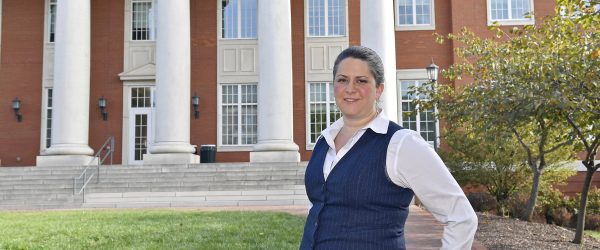Genomics researcher receives prestigious grant and inspires the next generation

A $1.83 million grant from the National Institutes of Health (NIH) will allow UNC Charlotte researcher Rebekah Rogers to continue her focus on complex genetic mutations, which are important in the study of autism, cancer, immune disorders and reproductive disorders.
The NIH Maximizing Investigators’ Research Award (MIRA) provides funding for five years to provide maximum flexibility for Rogers’ lab to study complex mutations as a source of evolutionary innovation that can form new genes, modify expression of existing genes and contribute to the genetic basis of evolutionary change. Rogers is an assistant professor in UNC Charlotte’s Department of Bioinformatics and Genomics in the College of Computing and Informatics.
While gene mutations are known to be associated with multiple diseases in humans and to contribute to adaptive changes in natural populations, they remain understudied. Rogers’ proposal seeks to fill the knowledge gap by identifying complex mutations shaping natural variation and adaptation.
“It turns out that these mutations are really good at creating new genes,” Rogers said. “They can copy an entire gene, mix and match pieces of genes or stick on/off switches next to regions that didn’t have genes before. By studying where, when and how these mutations do good things instead of bad things, we can start to figure out why some of them contribute to disease.”
The work in Rogers’ lab also is inspiring a new generation of genomic researchers. Brandon Turner ’19 began working in Rogers’ lab as an undergraduate mathematics student to perform computational work produced by the lab or from previous studies. Although he planned to seek a career in analytics, Turner became excited by the work on evolutionary processes and decided to pursue that path.
“Through Dr. Rogers’ support, I was able to attend two conferences where I presented my work from her lab. I realized that this is something that I could see myself doing. I’d like to run my own lab one day,” Turner said. “Dr. Rogers’ lab is a great option for math students who also have an interest in biology.”
Turner is now taking graduate courses with plans to pursue a Ph.D. in Bioinformatics and Computational Biology at UNC Charlotte. This interdisciplinary program brings together the specialties of biology, chemistry, mathematics and statistics, computing and informatics and engineering.
Theresa Miorin ’19 also had her future shaped by working as an undergraduate student in Rogers’ lab, where she was able to work on independent projects from start to finish.
“Without Dr. Rogers’ help and expertise, I would not have had such a remarkable experience in the research setting and would not have had the desire to continue my education in graduate school,” Miorin said.
After completing a bachelor’s degree in biology from the University in May, Miorin is pursuing a doctorate in genetics at the University of Georgia.
“Most of the students in my graduate school cohort have not had the detailed training I received in Dr. Rogers’ lab, particularly in computational biology,” Miorin stated. “I am beyond thankful that I am able to focus on my research projects instead of learning techniques in these areas.”